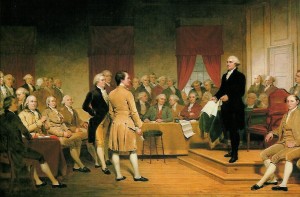The New York State
Constitutional Convention Clearinghouse
Information Related to New York's Nov. 7, 2017 Constitutional Convention Referendum
ARTICLE XIX–Amendments to Constitution
[Amendments to constitution; how proposed, voted upon and ratified; failure of attorney-general to render opinion not to affect validity]
Section 1. Any amendment or amendments to this constitution may be proposed in the senate and assembly whereupon such amendment or amendments shall be referred to the attorney-general whose duty it shall be within twenty days thereafter to render an opinion in writing to the senate and assembly as to the effect of such amendment or amendments upon other provisions of the constitution. Upon receiving such opinion, if the amendment or amendments as proposed or as amended shall be agreed to by a majority of the members elected to each of the two houses, such proposed amendment or amendments shall be entered on their journals, and the ayes and noes taken thereon, and referred to the next regular legislative session convening after the succeeding general election of members of the assembly, and shall be published for three months previous to the time of making such choice; and if in such legislative session, such proposed amendment or amendments shall be agreed to by a majority of all the members elected to each house, then it shall be the duty of the legislature to submit each proposed amendment or amendments to the people for approval in such manner and at such times as the legislature shall prescribe; and if the people shall approve and ratify such amendment or amendments by a majority of the electors voting thereon, such amendment or amendments shall become a part of the constitution on the first day of January next after such approval. Neither the failure of the attorney-general to render an opinion concerning such a proposed amendment nor his or her failure to do so timely shall affect the validity of such proposed amendment or legislative action thereon. (Formerly §1 of Art. 14. Renumbered and amended by Constitutional Convention of 1938 and approved by vote of the people November 8, 1938; further amended by vote of the people November 4, 1941; November 6, 2001.)
[Future constitutional conventions; how called; election of delegates; compensation; quorum; submission of amendments; officers; employees; rules; vacancies]
§2. At the general election to be held in the year nineteen hundred fifty-seven, and every twentieth year thereafter, and also at such times as the legislature may by law provide, the question “Shall there be a convention to revise the constitution and amend the same?” shall be submitted to and decided by the electors of the state; and in case a majority of the electors voting thereonshall decide in favor of a convention for such purpose, the electors of every senate district of the state, as then organized, shall elect three delegates at the next ensuing general election, and the electors of the state voting at the same election shall elect fifteen delegates-at-large. The delegates so elected shall convene at the capitol on the first Tuesday of April next ensuing after their election, and shall continue their session until the business of such convention shall have been completed. Every delegate shall receive for his or her services the same compensation as shall then be annually payable to the members of the assembly and be reimbursed for actual traveling expenses, while the convention is in session, to the extent that a member of the assembly would then be entitled thereto in the case of a session of the legislature. A majority of the convention shall constitute a quorum for the transaction of business, and no amendment to the constitution shall be submitted for approval to the electors as hereinafter provided, unless by the assent of a majority of all the delegates elected to the convention, the ayes and noes being entered on the journal to be kept. The convention shall have the power to appoint such officers, employees and assistants as it may deem necessary, and fix their compensation and to provide for the printing of its documents, journal, proceedings and other expenses of said convention. The convention shall determine the rules of its own proceedings, choose its own officers, and be the judge of the election, returns and qualifications of its members. In case of a vacancy, by death, resignation or other cause, of any district delegate elected to the convention, such vacancy shall be filled by a vote of the remaining delegates representing the district in which such vacancy occurs. If such vacancy occurs in the office of a delegate-at-large, such vacancy shall be filled by a vote of the remaining delegates-at-large. Any proposed constitution or constitutional amendment which shall have been adopted by such convention, shall be submitted to a vote of the electors of the state at the time and in the manner provided by such convention, at an election which shall be held not less than six weeks after the adjournment of such convention. Upon the approval of such constitution or constitutional amendments, in the manner provided in the last preceding section, such constitution or constitutional amendment, shall go into effect on the first day of January next after such approval. (Formerly §2 of Art. 14. Renumbered and amended by Constitutional Convention of 1938 and approved by vote of the people November 8, 1938; further amended by vote of the people November 6, 2001.)
[Amendments simultaneously submitted by convention and legislature]
§3. Any amendment proposed by a constitutional convention relating to the same subject as an amendment proposed by the legislature, coincidently submitted to the people for approval shall, if approved, be deemed to supersede the amendment so proposed by the legislature. (Formerly §3 of Art. 14. Renumbered and amended by Constitutional Convention of 1938 and approved by vote of the people November 8, 1938.)
Source: New York Constitution
